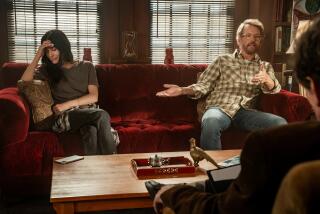Life of Hope, Striving and Responsibility Began on the Dole
- Share via
The pillorying of Anita Hill aside, perhaps the most chilling revelation that came out of the Clarence Thomas confirmation hearings was his willingness to scapegoat his sister as a welfare queen, a sentiment he repeated a number of times, most notably in a 1980 speech to black conservatives. The stereotype was made all the more shameful by the fact that welfare helped his sister care for her children and an ailing aunt.
Assimilation and responsibility lie at the center of Rosemary Bray’s passionate memoir, “Unafraid of the Dark,” but unlike Thomas, Bray, whose own mother might have been called a welfare queen (if the term had existed 30 years ago), proudly owns up to the circumstances of her family and childhood in the 1960s. To be poor and black on the South Side of Chicago meant living in a world framed by cold, hunger and a darkness lit by a check that arrived on the first of each month. Seen from today’s vantage, that posting, a phenomenon that started in the 1930s and essentially ended two years ago, was a remarkable aberration in American life, a radical departure--not lost on Bray--from this culture of self-reliance.
“I have been given priceless gifts I have no right to squander: a family, a once-committed nation, the luxuries of education and political awareness, opportunity and time,” Bray concedes. “Most of all, I understand that these things were mine for a reason: to secure for others what was once secured for me. I have always imagined the path I traveled would remain there for others. I had always imagined that hands would guide the others who would follow me.”
Her family--three siblings, a mother, and a father with a murderous rage--subsisted primarily on Aid to Families With Dependent Children. At worst, it was an invasive and humiliating system; at best, it preserved a perilously fragile family. Had the Personal Responsibility and Work Opportunity Reconciliation Act of 1996 been bootstrapped when Bray was a child, her mother would have been out of the home each day, the children exposed to the neighborhoods and father’s violent binges.
*
Her life, however, was not completely defined by the dole. Woven into this thread of years is a mother’s indefatigable love and a father’s extreme conviction that education was the only thing whites couldn’t steal from blacks. Bray attended a predominantly white Catholic school and, with the help of a scholarship and affirmative action, went on to Yale. She has worked since as an editor for Essence, Ms. and the New York Times Book Review.
But America outside the South Side was not easy, and Bray writes chillingly of the incipient conservative backlash in the mid-’70s that led to the Reagan Revolution and reached an ill-sounding crescendo when the Senate approved Thomas’ appointment for the seat vacated by Thurgood Marshall. During a dinner in 1976, Phyllis Schlafly asked her: “You’re here at Yale on scholarship, aren’t you?,” adding, “Now, you see, my children didn’t get a scholarship to college. Why should we be penalized because we have more money than your family?” Bray avoids answering this thorny question and, at times, regrettably relies more on rhetoric and passion--which are not unconvincing--to carry her argument that welfare is morally right. In other moments, her story lapses into tedious details, as if the mundane might humanize the polemic. But Bray’s polemic unavoidably sears this narrative.
Personal achievement is hard to explain, equivocation even more difficult. From Booker T. Washington to modern memoirists like Jill Nelson and Brent Staples, African Americans have struggled to understand and explain what success means, where it came from and at whose expense. Thomas found his answer, and Bray offers hers, but not before wondering if it may be “too late to undo the damage done to our characters as Americans by the erosion to our faith in the possibility of change.”
“We have been poisoned,” she writes, “by the idea that nothing we do matters, that nothing the government does will matter. This is a lie.” If only her antidote were as easy to administer as the bitter pill politicians would have us swallow.
More to Read
Sign up for our Book Club newsletter
Get the latest news, events and more from the Los Angeles Times Book Club, and help us get L.A. reading and talking.
You may occasionally receive promotional content from the Los Angeles Times.











